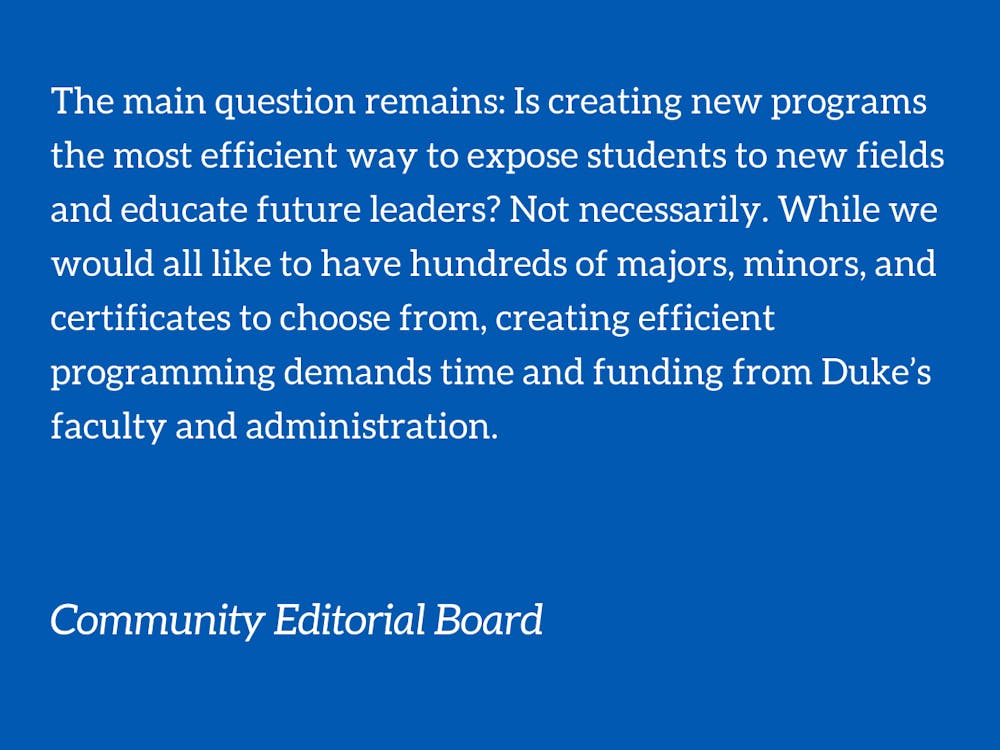Disability and Health Studies are often overlooked in higher education, and Duke is no exception. For years, the Duke Disability Alliance (DDA), along with students and faculty, have advocated the importance of integrating this discipline into Duke’s academic curriculum, in the form of a minor. The proposed creation of a new minor opens up an ongoing discussion on Duke’s campus: what fields of study merit their own department, major, minor, or certificate? Students have previously pushed for the creation of an Ethnic Studies department, an Urban Studies certificate program and an Asian American Studies program.
One avenue that Duke has used to integrate new, interdisciplinary topics into its curriculum is through certificate programs, an innovative path towards a more holistic education. The most recent addition is the Digital Intelligence Certificate, which was approved just this fall. But what distinguishes certificates from other types of programs? In the words of Michael Munger, the director of the Philosophy, Politics, and Economics Certificate, “the advantage of the certificate program generally is that it adds breadth on top of a major, which is depth”. This can certainly be the case if the program is cohesive, thoroughly planned, and introduces new opportunities, motivating students to partake in the course of study. The value a certificate program can add to the Duke curriculum is notable. For instance, Neuroscience and Global Health majors originated as certificate programs and were upgraded following significant demand.
Although past certificates have created numerous classes and presented impressive results, that is unfortunately not the case for some of the most recent ones. Marxism and Society, for example, was discontinued in 2018 due to a lack of demand. The aforementioned Digital Intelligence certificate only offers two requisites based in the Science and Society department: “Computing and Ethics” and Digital Intelligence Capstone”; the remaining four courses are electives based in other departments. It is not the only certificate structured in this manner, and while we understand that creating new options takes a lot from a department, simply reclassifying and regrouping existing courses is not enough. For a certificate program to thrive, there cannot be a lackluster effort from faculty or significant overlap with other programs according to José María Rodríguez García, chair of the Arts and Sciences Council.
The main question remains: Is creating new programs the most efficient way to expose students to new fields and educate future leaders? Not necessarily. While we would all like to have hundreds of majors, minors and certificates to choose from, creating efficient programming demands time and funding from Duke’s faculty and administration.
We are not arguing that the new proposed program topics are not valuable, but that minor programs are not the most effective way to integrate such subjects into the Duke curriculum. Rather, Duke should consider other avenues to teach these topics to all undergraduates. Using the example of Disability Studies, Duke could increase student awareness and understanding about the topic of disability via workshops, which could follow the model of the Sexual Assault Prevention training, or as part of a required ethics course for undergraduates. Another option is through Writing 101 courses, taking inspiration from the existing “Disability and Democracy”, “Asian American Narratives” and “Latinx Lit and Culture” sections. Similar innovative classes include University 101, which explores the concept of race in the U.S. and the rest of the world.
After all, shouldn’t a liberal arts education expose students to a multitude of topics without depending on the formal creation of new programs? Students are often so preoccupied with fulfilling major and degree requirements that they do not get a chance to enrich their main field of study by exploring other disciplines. Thus, students miss out on the core purpose of a liberal arts college experience. Rather than adding another minor or certificate, students should focus on crafting a schedule consisting of a plethora of classes that pique their interest across disciplinary fields. In this way, creating new official minor and certificate programs is not necessary for students to receive a successful liberal arts education at Duke.
For the minority of students who would like their core field of study to be disability or ethnic studies, Duke offers an Interdepartmental Major (IDM) or Program II. These programs are not without their fair share of problems – to participate, students must go through the strenuous application process, which includes long information sessions, numerous advisor meetings, a long-range plan, and a 4-6 page long personal statement. Instead of focusing its efforts on creating new departments with limited staffing and funding, Duke could focus on improving student access to these existing programs that promote the values of an interdisciplinary liberal arts education.
It is inspiring to see that Duke students are passionate enough about certain topics to advocate for their formal integration into our curriculum. Among the many skills that Duke graduates should have, such as critical thinking, reasoning, writing and analytical abilities, there should also be a space for learning about cross-cultural issues, such as those related to minority groups and people with disabilities. Inclusive knowledge is not only fundamental in the formation of educated citizens but also a valuable tool in students’ future professions, equipping them to become leaders in whichever area they choose. However, it is important to consider whether the university could realistically accommodate all of these requests, and rather focus on bolstering existing programming to include these new topics. As for students, it is important to remember the value in a holistic liberal arts education. Instead of adding another minor or certificate into your degree program, take that class that sounds interesting – you won’t regret it.
The Community Editorial Board is independent from the editorial staff of the Chronicle. Their column usually runs on alternate Tuesdays.
Get The Chronicle straight to your inbox
Sign up for our weekly newsletter. Cancel at any time.

